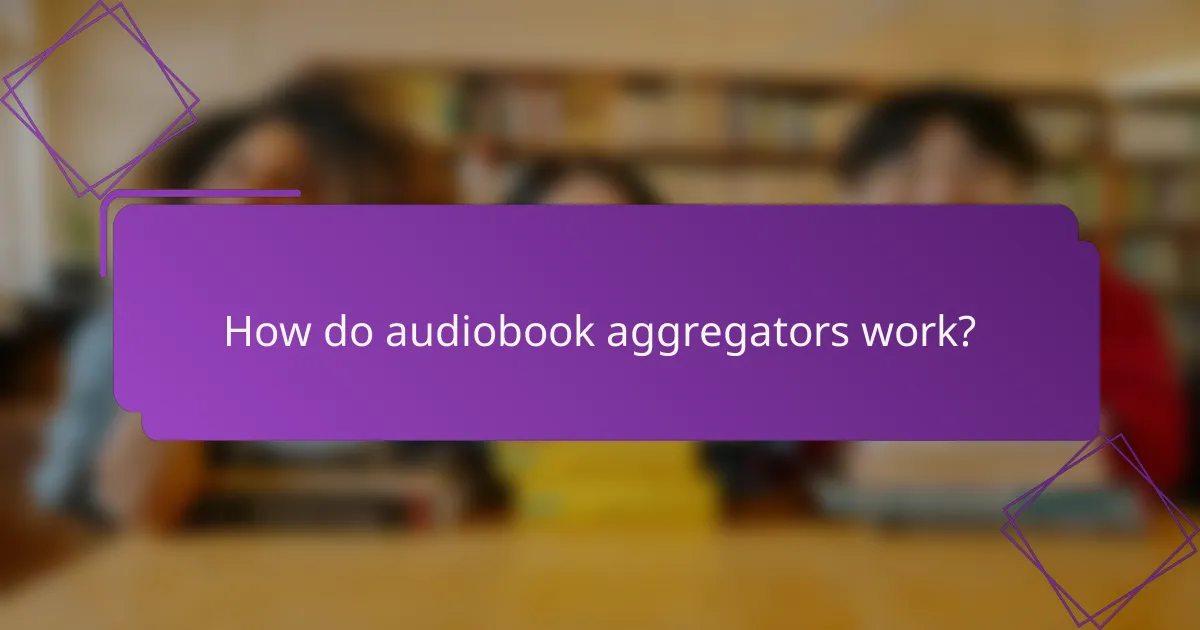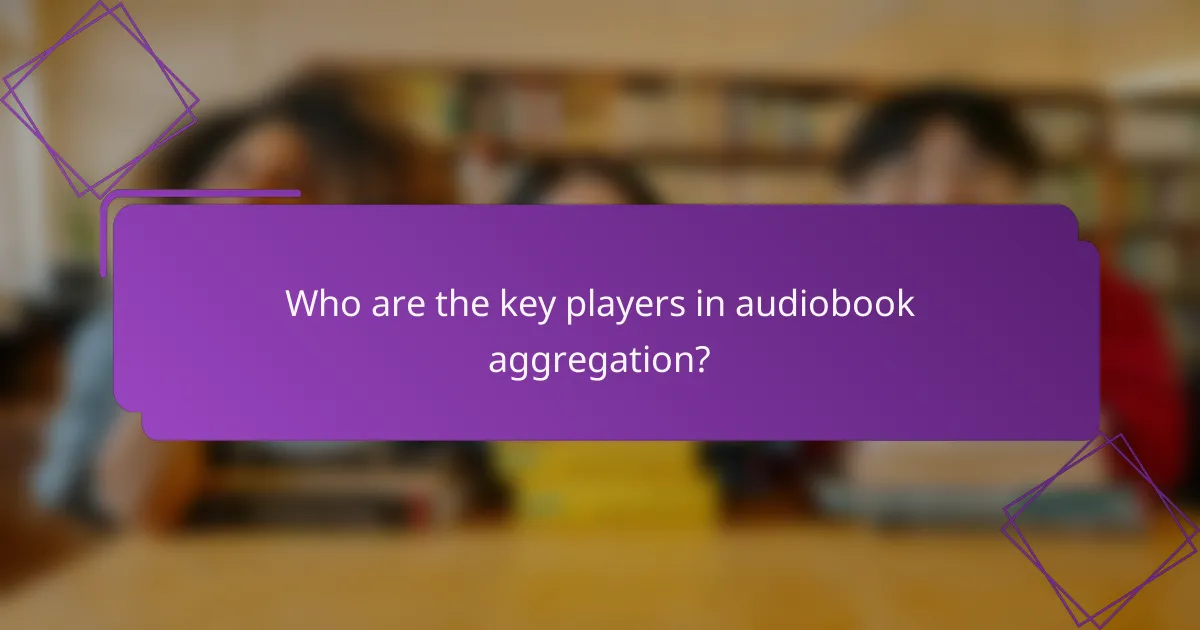Audiobook aggregators play a crucial role in connecting creators with distribution platforms, simplifying the publishing and monetization process for audiobooks. By consolidating a diverse range of titles, these intermediaries enhance accessibility for listeners while offering cost-effective options. Key players in this space provide unique features and pricing models, catering to the varied preferences of audiobook consumers.

How do audiobook aggregators work?
Audiobook aggregators serve as intermediaries that connect audiobook creators with various distribution platforms. They streamline the process of publishing, distributing, and monetizing audiobooks across multiple channels, making it easier for authors and publishers to reach a wider audience.
Platform integration
Audiobook aggregators integrate with various platforms such as Audible, Google Play, and Apple Books, allowing creators to upload their content once and distribute it across multiple services. This integration simplifies the publishing process and reduces the time and effort required to manage multiple accounts.
Many aggregators also offer tools for tracking sales and performance metrics across these platforms, enabling creators to make informed decisions about their marketing strategies. Examples of popular aggregators include Findaway Voices and Author’s Republic.
Content distribution
The content distribution process involves the aggregator converting the audiobook files into the required formats for different platforms. This ensures compatibility and optimizes the listening experience for users on various devices.
Aggregators typically handle the complexities of licensing and copyright, ensuring that creators receive the appropriate royalties. They may also provide promotional opportunities, such as featured placements or discounts, to enhance visibility and sales.
User access
User access to audiobooks through aggregators is generally straightforward. Listeners can find audiobooks on their preferred platforms, often with features like subscription models or pay-per-download options. This variety allows users to choose how they want to consume content.
Additionally, many aggregators support accessibility features, such as adjustable playback speeds and bookmarks, enhancing the overall user experience. It’s essential for users to explore different platforms to find the best options that suit their listening habits and preferences.

What are the benefits of using audiobook aggregators?
Audiobook aggregators provide numerous advantages, including access to a wide range of titles, convenient listening options, and cost-effective pricing. These platforms consolidate various audiobook offerings, making it easier for users to find and enjoy their favorite content.
Wide selection of titles
Audiobook aggregators typically host a vast library of titles from multiple publishers and independent authors. This extensive selection allows listeners to explore different genres, including fiction, non-fiction, self-help, and more. Users can discover both popular bestsellers and hidden gems, catering to diverse tastes.
Many aggregators also feature exclusive content or early releases, enhancing the variety available. This means that listeners can often find unique audiobooks that may not be available on other platforms.
Convenient access
With audiobook aggregators, users can access their favorite titles anytime and anywhere, often through mobile apps or web platforms. This flexibility allows for seamless listening during commutes, workouts, or while performing household chores.
Most aggregators support various devices, including smartphones, tablets, and computers, ensuring that listeners can easily switch between devices without losing their place. Many platforms also offer offline listening options, enabling users to download audiobooks for use without an internet connection.
Cost-effectiveness
Audiobook aggregators often provide subscription models that allow users to access a large number of titles for a fixed monthly fee. This can be more economical than purchasing individual audiobooks, especially for avid listeners who consume several titles each month.
Some platforms also offer free trials or promotional discounts, making it easier for new users to explore their services without a significant financial commitment. Additionally, many aggregators feature sales or special offers, allowing users to purchase audiobooks at reduced prices.

Who are the key players in audiobook aggregation?
The key players in audiobook aggregation include platforms that collect and distribute audiobooks from various publishers, making them accessible to consumers. These platforms offer unique features and pricing models, catering to different user preferences and needs.
Audible
Audible, an Amazon company, is one of the largest audiobook aggregators, offering a vast library of titles across various genres. Users can subscribe for a monthly fee, which typically includes one audiobook credit and discounts on additional purchases.
With features like personalized recommendations and the ability to listen offline, Audible appeals to avid listeners. However, users should consider the subscription cost versus their listening habits to determine if it provides good value.
Scribd
Scribd operates as a subscription service that provides access to a wide range of audiobooks, e-books, and other content. For a monthly fee, users can enjoy unlimited access to its library, which includes both popular and lesser-known titles.
This model is beneficial for users who enjoy exploring different genres without committing to individual purchases. However, the selection may not be as extensive as that of dedicated audiobook platforms like Audible.
Google Play Books
Google Play Books allows users to purchase and listen to audiobooks without a subscription. This pay-per-title model is ideal for those who prefer to buy specific audiobooks rather than commit to a monthly fee.
With features like syncing across devices and integration with Google Assistant, it offers a convenient listening experience. However, users may find that prices vary significantly, so comparing options before purchasing is advisable.

How to choose the right audiobook aggregator?
Choosing the right audiobook aggregator involves considering factors such as content variety, subscription models, and user interface. Each aggregator offers unique features that cater to different listening preferences and budgets, making it essential to evaluate them based on your specific needs.
Content variety
Content variety is crucial when selecting an audiobook aggregator, as it determines the range of genres and titles available. Look for platforms that offer a diverse library, including bestsellers, classics, and niche categories. Some aggregators may focus on specific genres, while others provide a broader selection.
For example, platforms like Audible are known for their extensive catalog, while others may specialize in independent authors or specific genres like self-help or business. Assessing the content variety can help ensure you find audiobooks that align with your interests.
Subscription models
Subscription models vary significantly among audiobook aggregators, impacting how you access content. Some platforms offer a monthly fee for a set number of credits, allowing you to choose any audiobook, while others may provide unlimited access to a curated library for a flat rate.
For instance, Audible operates on a credit system, giving users one credit per month for any audiobook, whereas services like Scribd offer unlimited access to a selection of audiobooks and other media. Consider your listening habits and budget when evaluating these models to find the best fit.
User interface
A user-friendly interface enhances the audiobook experience, making it easier to browse, search, and listen. When choosing an aggregator, pay attention to the design and functionality of the app or website. A well-organized library, intuitive navigation, and features like bookmarks and playback speed adjustments can significantly improve usability.
Some platforms may offer additional features, such as personalized recommendations or social sharing options, which can enhance your listening experience. Testing the interface through free trials can help you determine which aggregator feels most comfortable and meets your needs effectively.

What are the pricing models for audiobook aggregators?
Audiobook aggregators typically operate under two main pricing models: subscription fees and pay-per-title costs. Understanding these models helps users choose the best option based on their listening habits and budget.
Subscription fees
Subscription fees are a common pricing model for audiobook aggregators, allowing users to pay a monthly or annual fee for access to a library of audiobooks. This model often includes a set number of credits per month that can be exchanged for audiobooks, making it cost-effective for avid listeners.
For example, services like Audible charge around $15 per month, providing one credit that can be used for any audiobook, along with discounts on additional purchases. This model is beneficial for users who listen to multiple audiobooks each month, as it can lead to significant savings compared to purchasing titles individually.
Pay-per-title costs
Pay-per-title costs involve purchasing audiobooks individually, which can be appealing for casual listeners who may not want a subscription. This model allows users to pay only for the titles they want, without any ongoing commitment.
Prices for individual audiobooks can vary widely, typically ranging from $10 to $30 each, depending on the title and publisher. This option is ideal for users who prefer to select specific books rather than commit to a monthly fee, but it can become more expensive for frequent listeners.


